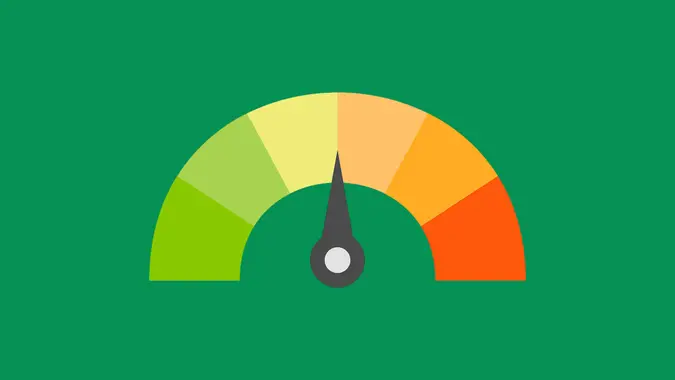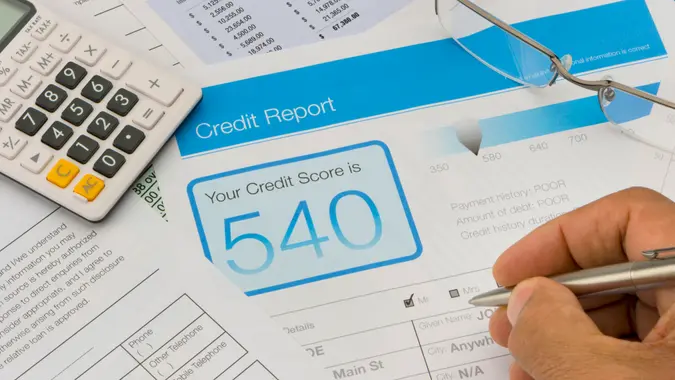When Do Credit Scores Update? Here’s Exactly How Often Your Score Changes

Commitment to Our Readers
GOBankingRates' editorial team is committed to bringing you unbiased reviews and information. We use data-driven methodologies to evaluate financial products and services - our reviews and ratings are not influenced by advertisers. You can read more about our editorial guidelines and our products and services review methodology.

20 Years
Helping You Live Richer

Reviewed
by Experts

Trusted by
Millions of Readers
Have you ever checked your credit score right after making a payment, only to find it hasn’t changed at all? It can feel confusing or even frustrating, leaving you to wonder: “When do credit scores update?”
Understanding exactly how often and why your credit score updates can make managing your finances easier and far less stressful. Knowing when to expect updates helps you track improvements and feel more in control of your financial future.
Let’s clear things up and help you understand exactly how often credit scores change, why these updates happen and what you can do to stay informed.
How Credit Scores Work
Let’s start with a quick refresher: Your credit score is essentially a snapshot of your creditworthiness. It tells lenders how responsible you’ve been with your financial obligations, like loans and credit cards.
Scores usually range from 300 to 850, with higher scores showing lenders you’re reliable when borrowing money. Your credit score is based on information listed in your credit report, which typically includes:
- Your payment history (whether you’ve paid bills on time).
- How much credit you’re currently using compared to your available limits (also called credit utilization).
- New accounts or recent credit inquiries.
Whenever your credit report information changes, your credit score changes, too.
When Do Credit Scores Update?
Your credit score updates every time your credit report changes, but the exact timing varies. Most lenders, like credit card companies, banks or loan providers, report your financial activity to credit bureaus roughly once per month.
Some common reasons your credit score might update include:
- Making payments: When you pay a credit card bill or loan installment.
- Paying off debt: Clearing a debt completely or significantly lowering a balance.
- Applying for new credit: A hard inquiry shows up when you apply for a loan or credit card.
- Opening or closing accounts: Changes in your available credit or the number of accounts.
Because lenders have their reporting schedules, updates don’t happen all at once, making the timing slightly unpredictable.
How Often Do Credit Scores Update?
There isn’t one fixed day when credit scores update monthly. Instead, scores can change multiple times each month. This depends entirely on your lenders send their latest data to the three major credit bureaus — Experian, Equifax and TransUnion.
Typically:
- Credit card companies report your payment activity monthly, usually shortly after your billing cycle ends.
- Loan providers (like mortgage companies, student loan servicers and auto lenders) typically update your credit monthly.
- New credit accounts generally appear on your report within a few weeks of opening.
Important to know: Not all your accounts update simultaneously. For instance, if your credit card provider updates your account on the 12th of every month, your car loan provider might report on the 25th. This staggered reporting explains why your credit score might shift multiple times monthly.
What Triggers a Change in Your Credit Score?
Several common activities can quickly trigger a credit score update. These include:
- Payments (or missed payments): Paying on time boosts your score, while late payments can cause noticeable drops.
- Balance fluctuations: Big changes in your credit utilization (either increasing or decreasing balances) typically affect your score.
- Hard inquiries: Every time you apply for credit, your score may temporarily dip due to the inquiry.
- Debt payoff: Completely paying off a loan or significantly reducing a credit card balance often raises your credit score.
- Negative items: Collections, bankruptcies or charge-offs can swiftly lower your score.
For example, reducing a high credit card balance by even a modest amount — say, $200 — can slightly raise your score within a month or so.
How Fast Do Payments Show Up on Your Credit Score?
It usually takes about 30 days for positive activities — like paying off a large debt — to appear on your credit report and influence your score. This is because lenders usually report once a month, not immediately after your payment clears.
On the flip side, negative actions, like missed or late payments, tend to show up more quickly, often within days or a week after the missed due date.
If you want to see changes quickly, consider using credit monitoring services like Credit Karma or Experian, which regularly refresh their data directly from credit bureaus.
Does Everyone’s Credit Score Update at the Same Pace?
No — everyone’s credit score updates differently. Your specific update frequency depends on:
- How many credit accounts do you have?
- Your lenders’ reporting schedules.
- How actively you’re applying for credit or changing balances.
If you have multiple credit cards and loans, your credit score likely updates more frequently. But if you have just one or two accounts, you’ll probably see fewer changes.
Do All Credit Scores Update at the Same Time?
No — credit scores don’t update on a fixed schedule or all at once across the board. Instead, they’re calculated dynamically, meaning your score only changes when it’s pulled by a lender, credit monitoring service, or you.
Even if all three credit bureaus have the same information on file, your score can still vary depending on:
- Which bureau the score is pulled from (Experian, TransUnion, or Equifax)
- Which scoring model is used (like FICO 8, FICO 9, or VantageScore 3.0)
- When the score is accessed, since your credit report may have changed since the last pull
Because of these variables, it’s common to see slightly different scores at the same time–even from the same lender.
Easy Ways to Track When Your Credit Score Updates
If you want to regularly check your credit score updates, there are several reliable, free tools available:
- Credit Karma: Provides frequent updates based on the VantageScore model.
- Experian’s Free App: Gives you monthly FICO scores — the type most lenders use.
- Your Bank or Credit Card Provider: Many institutions offer free credit score monitoring as part of their services.
- AnnualCreditReport.com: Access your full credit reports (though typically without the score) for free annually.
Checking your credit regularly is a smart financial habit and don’t worry — it won’t harm your score at all.
Quick Tips for Boosting Your Credit Score Faster
While you can’t force credit bureaus to update quicker, you can make strategic moves to improve your score over time:
- Always pay your bills on time.
- Aim to keep credit card balances low, ideally below 30% of your available credit.
- Avoid applying for multiple credit products in a short timeframe.
- Regularly check your credit reports to catch and correct errors early.
When Do Credit Scores Update?
So, when do credit scores update? Typically, monthly — whenever lenders send new data to the credit bureaus. Although updates aren’t instantaneous, consistently responsible behavior will eventually reflect positively in your score.
Keep these key points in mind:
- Updates usually occur within 30 days of your financial actions.
- Your score might change multiple times each month if you have several accounts.
- Regularly checking your credit score helps you track changes without hurting your credit.
Want to get started? Use a trusted app or your bank’s free tools to check your credit regularly, giving you control and confidence over your financial health.
Ready to learn more about boosting your credit?
Check out these helpful articles to guide you further:
- Credit Report vs. Credit Score: What’s the Difference?
- 6 Fastest Ways To Boost Your Credit Score If You Need a Loan This Year
- Here’s How Often You Should Check Your Credit Report
FAQs About When Credit Scores Update
Here are some common questions that come up while looking into how and when credit scores update:- How quickly does my credit score update after making a payment?
- Usually within 30 days, though the exact timeframe depends on your lender’s reporting cycle.
- Can my credit score change more than once in a single month?
- Yes, if you have multiple accounts reporting to the bureaus at different times, your score can change several times per month.
- Do all three credit bureaus update at once?
- Nope, they all operate independently. Experian might update first, Equifax next and TransUnion last, or vice versa.
- Will checking my credit score delay or lower updates?
- Not at all. Checking your own score is a soft inquiry and does not affect your credit updates.
The information is accurate as of March 26, 2025.
Editorial Note: This content is not provided by any entity covered in this article. Any opinions, analyses, reviews, ratings or recommendations expressed in this article are those of the author alone and have not been reviewed, approved or otherwise endorsed by any entity named in this article.
Our in-house research team and on-site financial experts work together to create content that’s accurate, impartial, and up to date. We fact-check every single statistic, quote and fact using trusted primary resources to make sure the information we provide is correct. You can learn more about GOBankingRates’ processes and standards in our editorial policy.
- CFPB "What is a credit score?"
- FTC "Credit Scores"
- Experian "What Affects Your Credit Scores?"
- Equifax "When Does a Late Credit Card Payment Show Up on Credit Reports?"
- AnnualCreditReport.com "website"
- FICO "What is a Credit Score?"
 Written by
Written by  Edited by
Edited by 






















